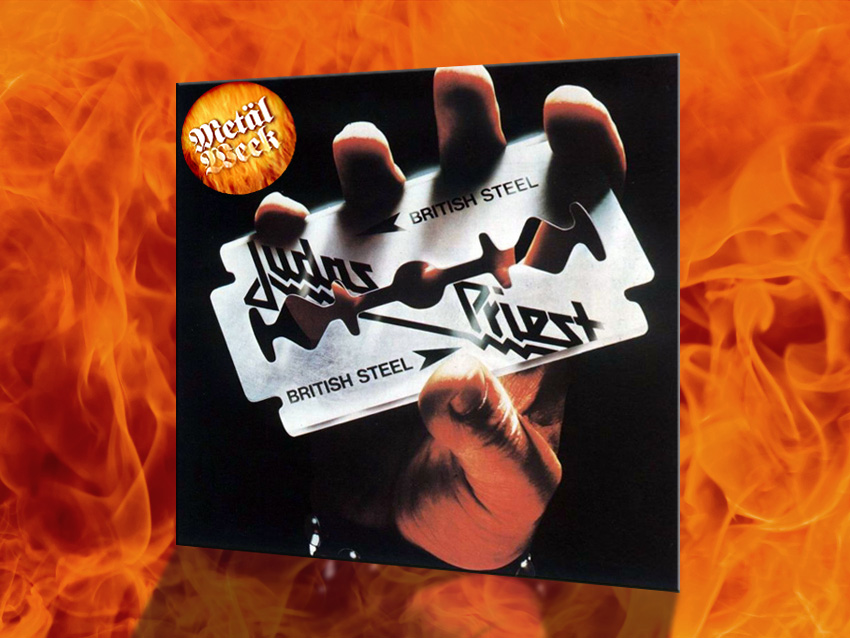
Intro
"We had no idea we were making anything special," says Judas Priest guitarist Glenn Tipton of the 1980 album British Steel, now celebrating its 30th anniversary and heralded by millions of fans as a defining moment, not only for the band but for heavy metal as a genre.
"After we finished it, we listened back and we knew we liked it, but we couldn't have anticipated the effect it would have on our careers. Its success shocked us all."
Co-guitarist KK Downing recalls that “the songs felt a bit tighter than anything we had done prior. But we didn’t sit down and say, 'Right, this is what we need to get on the radio.' As the saying goes, we were flying by the seat of our pants.”
The band (Tipton, Downing, singer Rob Halford, bassist Ian Hill and then-drummer Dave Holland) set up shop at Tittenhurst Park, a Georgian manor house located on 72 acres of land in Sunninghill near Ascot in England. Previously owned by John Lennon, it was then the residence of Ringo Starr.
Tipton: “It sounds rather elegant to say, ‘Oh yeah, we recorded where two of The Beatles lived', but we went there because it was available and we thought, 'Let’s get out of the same old studios and see what happens.'
"We did what Led Zeppelin had started doing in the early '70s, putting our amplifiers all over the house and situating the drum kit near the stairwell. Those kind of tricks really did get you some nice sounds."
Containing the radio hits Breaking The Law and Living After Midnight, some diehard Priest fans claimed the band had 'gone pop,' but Downing sees the record as "most definitely a metal album. Sure, it does have a more universal appeal than our earlier work. But we were just trying to make something that we liked. If you'd told us that we’d still be talking about British Steel 30 years later, we would’ve thought you were crazy.”
As for Tipton, he views British Steel as "that moment where everything was right and nothing went wrong. Between the title, the album cover with the giant razor blade, and the way we were defining our look and sound, all the pieces fell into place. We were damn lucky.”
With the newly remastered, deluxe 30th anniversary edition of British Steel about to be released, guitarists Tipton and Downing sat down with MusicRadar to reflect on the original nine-song disc that changed their lives.
Next page: Rapid Fire
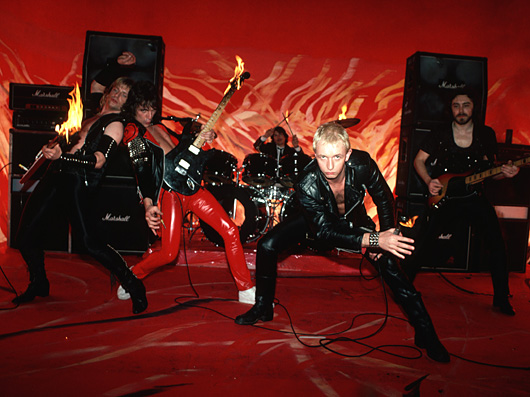
Rapid Fire
Glenn Tipton says:
“We wrote it on the spot. Unlike our other albums, we weren’t fully prepared when we starting cutting British Steel, so many of the songs were written as we went along.
“With Rapid Fire, I think we just wanted to jolt the listeners and really grab them. Our attitude was, ‘All right, people. No mucking around. Here’s an album you’re going to listen to.’”
KK Downing says:
“What’s amazing is, the whole album was written and recorded in 28 days, so we probably should have called the record Rapid Fire. That’s how fast we were going.
“It’s a cool track. I remember that we played it on stage last year and I thought, Wow, this is a really unusual song, composition-wise. It holds up extraordinarily well.”
Next page: Metal Gods
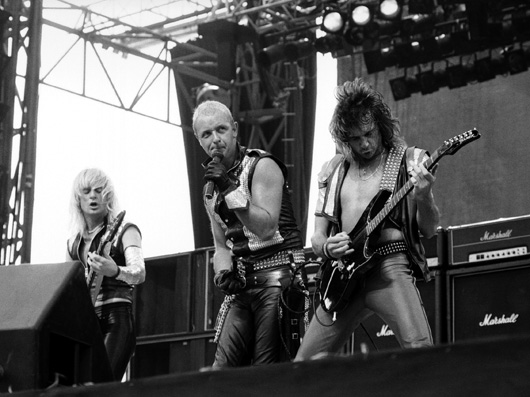
Metal Gods
Glenn Tipton says:
“I used an SG on this cut - actually, on a lot of the album - and I remember I had a lot of Marshall stacks in the downstairs living room and I was getting a good sound there.
“We were emerging at the time as, well, ‘metal gods,’ if you will. Everything was falling into place with our sound, our image, how we were being seen. I would say this song reflects our confidence.”
KK Downing says:
“It’s stayed in the Priest set since 1980, so I would say that’s a bold testimony to the song’s power and longevity.
“What’s funny is, there were no samples in those days, so we created our own. The clanking of the chains you hear is us raiding through Ringo Starr’s cutlery drawer and shaking knives and forks around. I don’t think he ever knew that... but he will now!”
Next page: Breaking The Law
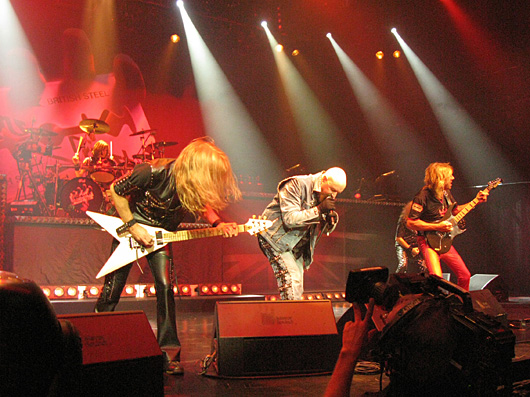
Breaking The Law
Glenn Tipton says:
“It’s one of our biggest hits, and funnily enough, we didn’t labour over it. It wasn’t written beforehand; in fact, I clearly recall bashing that riff out one afternoon as we were getting set to record something else.
“The best songs are always the ones that just happen, and this song exemplifies it. I sat down with the guitar and had nothing, and suddenly I had something pretty amazing. It was just meant to be that day. Good thing I picked up the guitar when I did or else it might not have popped into my head and fingers.”
KK Downing says:
“The sounds of the breaking glass was another one of self-created samples. In this case, it was us crashing milk bottles against the side of Ringo’s house. We did the clean-up job pretty well, I must say.
“I love the energy of the song. It might be one of our shortest cuts. Get in, punch hard and get out, you know?”
Next page: Grinder
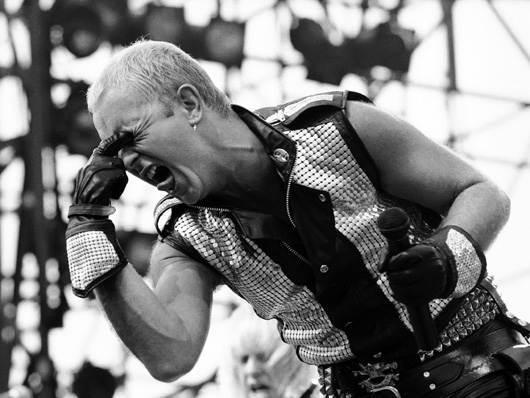
Grinder
Glenn Tipton says:
"It’s a typical Priest song. A ‘grinder’ can represent a being of some sort, either human or otherwise. It can be anything you like.
“That’s one of the great things about our songs: you can attach your own fantasies onto them. We might create the songs, but the fans make them their own.“
KK Downing says:
“Probably a song that AC/DC could have done. It’s got that same kind of groove to it that they’re famous for. We weren't trying to emulate them - it just worked out that way.
“Grinder definitely made a real connection with our fans, and it’s still in our repertoire. The message we were sending out was, ‘Be strong. Don’t let all the crap grind you down.’"
Next page: United
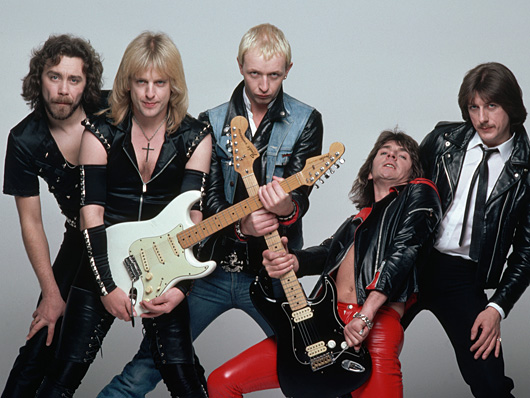
United
Glenn Tipton says:
“It’s a great anthem. Even though it’s not the last track on the record, it’s a great way to finalise the album. It says it all, really.
“We love creating songs where we can take them to the stage and make people feel as one - one with themselves, with us - and when that happens, it‘s overwhelming.”
KK Downing:
“The song titles keep coming at me. Sometimes I think that if you have the perfect title, the rest of the tune will come to you if you just let it.
"With United, we wanted our fans to know that we were just like them. We weren’t this rich, money-making machine; we were just regular guys trying to forge our way in the world. We were normal people, but together, we had incredible strength.”
Next page: You Don't Have To Be Old To Be Wise
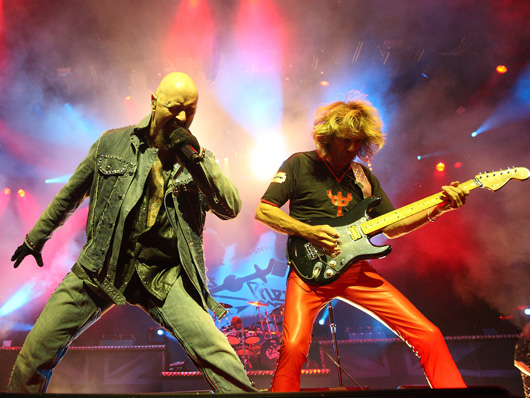
You Don't Have To Be Old To Be Wise
Glenn Tipton says:
“What a terrific statement. There’s a bit of a rebel quality to it. It’s us saying, ’We know what we’re doing.’ Even though we were pretty young at the time, we were asserting our independence.
“Is it punk? I guess there’s that essence. It was in the air at the time, the whole us-against-the-establishment movement. But that’s always happening. We just decided to write a song about it.”
KK Downing says:
“You could write this song today and it would still be relevant. Back then, we were tired of people putting us down for having long hair and thinking that we were nothing. Young kids nowadays probably feel the same way with how they dress and wear their hair.
“As metal artists, we were seen as louts and what have you, so this is us saying, 'No, we do matter. We’re important and we’re not stupid.’”
Next page: Living After Midnight
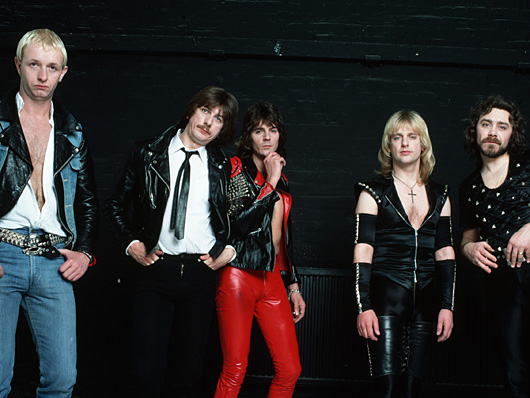
Living After Midnight
Glenn Tipton says:
“Rob had gone to bed one night - he’d had a bit to drink after a session, as he used to do in those days - but I decided to break out the guitar and crank it up to 11.
“So I’m bashing out these chords and Rob comes downstairs, with his hair all a mess - yes, he did have hair back then - and he goes, ‘What are you doing? It’s after midnight!’ And I went, ‘Yeah. Living after midnight!’ We had a laugh, but then we realised that it was a cool title.”
KK Downing says:
“Nobody believes me, but we had no idea it would be a massive hit. Quite frankly, we were shocked when it reached as many ears as it did.
“Glenn came up with the riff late at night, and after we stopped throwing shoes at him, like, 'Cool it. It’s late, man. Go to bed,' we quickly recognised that he might be on to something. Lo and behold, the masses agreed."
Next page: The Rage
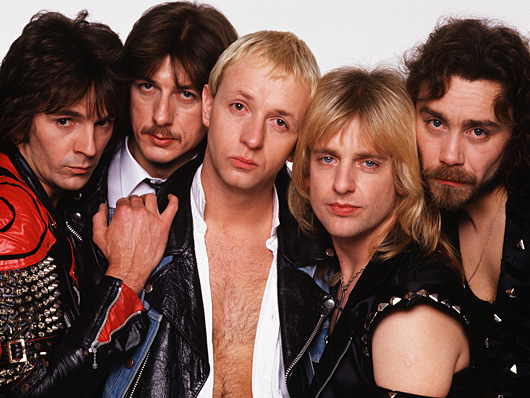
The Rage
Glenn Tipton says:
“A killer song, if you ask me, and probably one that was quite daring for us as a metal band at the time because it starts out with a reggae riff. Who would have expected that from Judas Priest?
“Also, the fact that it starts out with that riff makes everything even more forceful when the metal comes pouring in. I love The Rage. It’s probably one of my favourites.“
KK Downing says:
“A bit more moody, this one. We were always trying to broaden our horizons and expand what heavy metal could be. So you’ve got the reggae beginning and my solo is a bit bluesy and Paul Kossoff-like. He was a brilliant guitar player.
“Like with a lot of the other songs, we wanted to throw it to all the people who were putting us down. We were raging, hence the title. It was loads of fun to record.”
Next page: Steeler
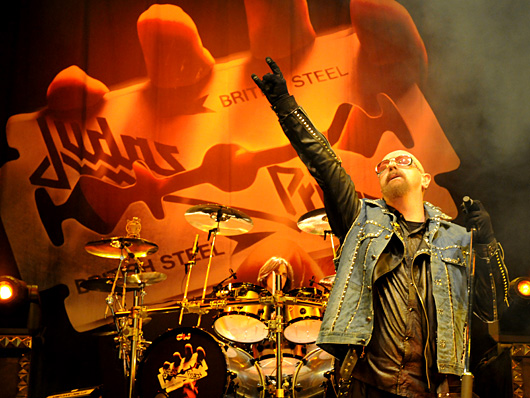
Steeler
Glenn Tipton says:
“As good an album closer as I can imagine. It relates to the album title, but it also says a lot about us as a band, as well, that we came from Birmingham, a rough town but one that was built, literally, from the British steel industry.
“I myself worked in the steel factory for a time; it’s where I apprenticed before I became a professional musician. I have tremendous respect for steel workers, but I guess it's true that I dreamed of getting out and seeing the world, doing my own thing. Steeler is a song that speaks to that desire.”
KK Downing says:
“Go out as you come in - that was our motto. We started off with a bang with Rapid Fire and went out pounding away.
“Plus, there’s the end part with me and Glenn trading off on guitars and having a good time. It’s very much a Black Country song. The steel workers were called Steelers, and we felt as though we were one of them, taking heavy metal - steel, if you will - and creating something with it. A beautiful way to end an album.”
Liked this? Now read: Tom Morello's 13 greatest heavy metal albums of all time
Buy Judas Priest here: Amazon, HMV, iTunes
Connect with MusicRadar: via Twitter, Facebook and YouTube
Get MusicRadar straight to your inbox: Sign up for the free weekly newsletter
Joe is a freelance journalist who has, over the past few decades, interviewed hundreds of guitarists for Guitar World, Guitar Player, MusicRadar and Classic Rock. He is also a former editor of Guitar World, contributing writer for Guitar Aficionado and VP of A&R for Island Records. He’s an enthusiastic guitarist, but he’s nowhere near the likes of the people he interviews. Surprisingly, his skills are more suited to the drums. If you need a drummer for your Beatles tribute band, look him up.
